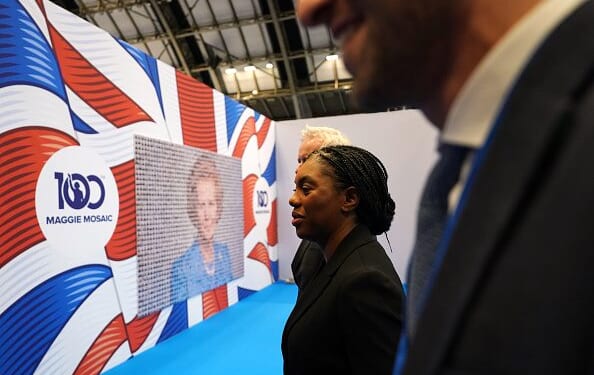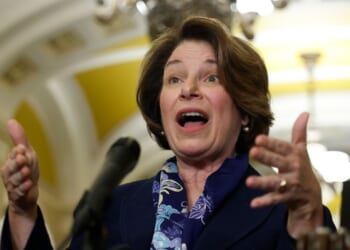The Iron Lady may be long dead. But her spirit lives on in Manchester this year. The conference fringe includes a Thatcher 100th birthday bash, her would-be centenary perhaps going some way to explaining her omnipresent image, Big Brother-like, staring out from every wall of the hall. The Tories, the most successful political party in the history of Western democracy, have resorted to wheeling out three glass-encased outfits worn by Margaret in a Norman Bates-style reanimation of their fallen leader’s sartorial and political imaginary. “It’s bloody good fun, isn’t it?” says a man-of-a-certain-age, as we both lean in to read the swooning explanatory note next to the famous tank outfit.
He’s not the only one for whom Thatcher’s looming face recalls a conservative adolescence of furtive, Freudian desires to kill Daddy and marry Maggie — of political vigour, economic brawn, Britannia unchained, and memories of happily selling England by the pound in the name of Austrian economists and market efficiency. But all that feels very distant now. For if opposition party conferences are meant to be about rallying the troops, raising spirits for the fight against a woefully unpopular government, the troops today feel demoralised. The atmosphere is of a wake soundtracked by a ageing tribute band.
For the Prime Minister’s losses have not been Kemi Badenoch’s gains. The faithful are vanishingly thin on the ground. Conference is empty; any of the sparse activity seems palpably futile. The quintessential party of government is being out-flanked on the Right by a top-down, one-man start-up act with little-or-no governing pedigree, but possessed of an appeal which speaks directly to the public’s baser, zero-sum instincts.
Gawping at ladies’ dresses, meanwhile, the Tories have clearly left the usual party-political state of self-delusion and entered a collective hallucination. Rather than stage a fightback, the foot-soldiers of the modern Conservative Party have retreated into nostalgia, yearning for the last time they were an ascendant force, forging a new national character with brutal efficiency, and taking aim against socialist Britain and the statist blob.
Here, at Thatcher-fest, is a world in which 2008 never happened, in which the entire model upon which the Iron Lady and her party built post-1979 Britain hadn’t fallen apart under the weight of an over-leveraged, out of control financial services sector. What’s more, the conditions which allowed the economic offer of Thatcherism to develop are no longer apparent. We’re no longer an energy exporter, enjoying a steady flow of North Sea tax receipts, and we’re not experiencing buoyant growth off the back of Chinese market reforms and Reaganite deficit spending. Nor is there a cross-border trend which allows government to escape the analogue economy of coal and steel, instead embracing the services and silicon chips of the late-20th century.
Taken together, the formula the Conservatives pursued for the past half-century has left us deeply vulnerable. We have an economy reliant on global trade flows and inward foreign investment with a yawning balance of payments; the UK recorded a trade in goods deficit of £226 billion last year, only partly offset by service exports. At the same time, we have privatised our assets, and left our infrastructure weak, and prioritised a growth model that concentrates wealth in London and the South East. In the regions, our industrial base withers. This was deemed to be a price worth paying, not only because manufacturing could be cheaply offshored, but also because the decline of industry tamed our once-mighty trade unions, an essential prerequisite of Thatcherite hegemony.
None of these prescriptions suits our era of geopolitical competition. Nor does the Thatcherite policy mix quell the populist backlash fermenting outside the metropolitan citadels. Even in urban areas, the primary beneficiaries of five decades of market liberalism, whereby the service industries and “knowledge economy” prospered, residents now baulk at voting Conservative, turned off by the provincial “Little England” aesthetics that offend their more refined, liberal-cosmopolitan tastes. Former industrial powerhouses and factory-dominated monotowns have meanwhile morphed into something we now call “left behind” Britain, now rising in nationalist revolt. There was a brief period where a nascent red Toryism, with an agenda focused on regional investment and industrial revival, tied together a Leave-voting, post-industrial working-class with more affluent voters in the southern shires. But that Johnsonite experiment collapsed after Partygate, and, here, at Tory conference, there seems little interest in reviving a political strategy that conservative opinion writers chide as “neo-Brownite social democracy”.
“The Thatcherite policy can’t quell the populist backlash fermenting outside the metropolitan citadels.”
The Tories, with few exceptions, have no alternative and no response to the questions of the age. Over breakfast, I overhear four delegates discussing their hangovers and fantasising about abolishing the minimum wage. (It “has killed the service industry”, apparently.) One was giddy about Badenoch sitting behind him during one of Mel Stride’s appearances. Another was buzzing with excitement about the prospect of seeing Robert Jenrick. The shadow justice secretary is easily the most assured and media-savvy of the shadow cabinet. A former Remainer Cameroon, who now seems happier among the very online New Right, Jenrick is nakedly ambitious in a way that is unflattering.
But he is at least aligning himself with an emerging zeitgeist, aware of the scale of public discontent with a tired, failing political class, and the widespread disgust that defines the popular mood. His conference speech was full of Faragist sound and fury — “the collapse of the old order is in sight”, he told the hall, a vivid rebuke to the tradition of Burkean moderation and empiricist scepticism of continental-style ruptures that English conservatism embraced for four centuries.
In the end, though, Jenrick is no Thatcher: and not merely because he lacks her charisma as the political embodiment of Britain as a nation of shopkeepers. Stuart Hall, the Marxist cultural theorist, was in awe of the magnetic power of Thatcherism in its heyday. He was fascinated by its achievements, its construction of a new social bloc, an electoral coalition around a new political and economic consensus. It turned an aspirational working-class, made homeowners under Right to Buy, away from socialism. It united them with anxious suburbanites worried about crime, along with petty bourgeois business owners sick of union militants. In tow came the City of London and the “yuppies”, ready to be unshackled from a regulatory state.
“As an ideology”, Hall wrote, “Thatcherism addresses the fears, the anxieties, the lost identities, of a people. It invites us to think about politics in images. It is addressed to our collective fantasies, to Britain as an imagined community, to the social imaginary.” Its success lay in articulating grievances, exploiting crises, distilling a feeling, a mood, a collective (sub)consciousness into a political project, uniting disparate and sometimes contradictory strands of policy and political demographics into a unified, coherent whole. Thatcher’s Anglican traditionalism and old-fashioned family values sat awkwardly alongside breakneck industrial modernisation that destroyed centuries-old communal bonds, replacing a culture of collectivism with a raucously selfish individualism epitomised by a new “Loadsamoney” social category. But her political skill lay in papering over these cracks.
There is nothing approaching this kind of hegemonic ambition in Jenrick, his fierce rhetoric and frenzied viral posting notwithstanding. He may be assured in his culture war comfort zones, in his diatribes on crime, migration and patriotic renaissance. But he ultimately has no answer to the 17-year economic funk in which Britain still finds itself. Thatcherism, for all its faults, was a renewal project that succeeded in transforming Britain, identifying losers as well as winners, and turning the country away from a spluttering postwar model.
Where the grocer’s daughter met a crisis of social democracy and the collapse of postwar Keynesianism with a return to Victorian morality and Whiggish, free-trading economic liberalism, the Conservatives look at our own period of secular decline and can only flog the dead horse of her Thatcherite first principles. A financial services boom and the lifting of capital controls won’t save us now. There are few public assets, few national industries left to sell to the highest bidder. The family silver is gone.
Somewhere in the wings, figures such as Nick Timothy pursue an agenda more congruent with the times. His blue-collar conservatism talks about reindustrialisation; about productive, well-paid manufacturing work; about an active, interventionist state. Combined with an inclusive patriotism and restrictionist migration policy, that’s a fruitful political positioning for an electorate tired of a libertine Left and libertarian Right. But it’s not where the Conservative Party is as a whole, and certainly not where Badenoch is, nor where Jenrick has dared go before he makes his pitch to a membership of small-state true believers.
Reform is already beginning to pivot away from the politics of the “saloon-bar Thatcherite”, embracing public ownership, aspects of the welfare state, and attacking the banking sector. A Tory activist tells me that many of his comrades are treating this year’s conference as a goodbye party, a final hurrah with the True Blue crowd, before crossing no-man’s land to Nigel’s turquoise army. This is perhaps less down to ideology than personality. Like Thatcher, after all, Farage addresses the fears, the anxieties, the lost identities, of a people. His electoral coalition will constitute a rebuilt version of the short-lived 2019 realignment, uniting left-behind Britain with more affluent, more rural constituencies. Thatcher created her voter base. Who, in contrast, are Kemi Badenoch’s people? Smoking a cig, a senior party member tells me she’s “not a leader”, and siren voices in the party are growing increasingly vocal in favour of yet another change at the top.
But, then, who are Jenrick’s people? His preferred strategy seems to be that of the Farage tribute act, a bandwagon-jump, based on the calculation that if you can’t beat them, copy them. If the shadow justice secretary takes over, he’ll merely be the fifth leader the party has elected in five years, within an organisation struggling with its own identity, grasping at the straws of long-past glories but campaigning against their own 14 years of failure. The Tories are left unsure of their purpose in a world that they created but that has moved on, sailed away, leaving them stranded, downing pints in Manchester’s Midlands Hotel, wondering if their best bet is to jump aboard the good ship Reform. The Iron Lady will only sink them.

















